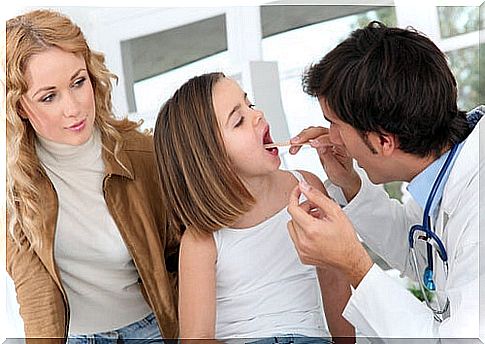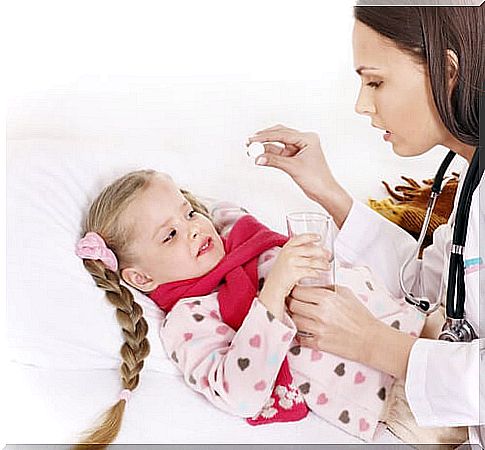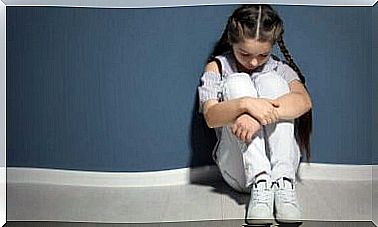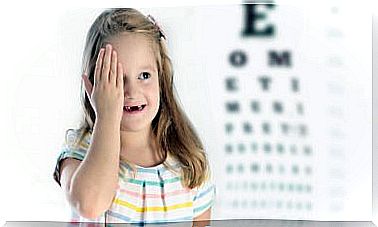Tonsillitis In Children: The Disease That Comes With The Cold

In most cases, inflammation of the pharyngeal mucosa is caused by an infection caused by a virus.
Pharyngitis is inflammation of the pharyngeal mucosa, which causes sore throat, irritation, fever and swelling in the tonsils. Tonsillitis in children can be caused by infection of the pharynx, which can be caused by a wide variety of microorganisms.
In most cases, a virus is responsible for the infection, and pharyngitis can be caused by a common cold. In very few cases pharyngitis can be caused by bacteria. In this case, the bacterium that causes this disease is called Group A streptococcus, which causes streptococcal pharyngitis.
Symptoms of tonsillitis in children
Generally, pharyngitis appears in the coldest months, especially in winter, when respiratory diseases appear more strongly. Also, it is a contagious disease. Therefore, contamination within the family nucleus is very likely. But for you to be prepared, here are the main symptoms:
- Severe sore throat. The child may have difficulty eating and swallowing. If we look at the child’s throat, it will be red and shiny from the disease.
- Fever.
- Headache.
- Inflamed lymph nodes.

Diagnosis of tonsillitis in children
The doctor will perform a pharyngeal exam to determine if there is drainage or coating. You can also examine the skin, eyes, and lymph nodes in the neck. If there is doubt that strep throat is contagious, a test can be performed to detect strep throat. In addition, it is possible to perform additional throat culture tests and blood tests according to the suspicion of the agent causing the discomfort.
Treatment of tonsillitis in children
Tonsillitis in children can be treated with acetaminophen or ibuprofen to reduce sore throat and fever. In addition, inflammation can improve by gargling with warm salt water six times a day. The measure is one teaspoon of salt per glass of water.
If the child experiences six repeated episodes of tonsillitis having been treated with antibiotics and following the pediatrician’s recommendations, referral to a specialist is common to study the severity of the case and determine whether or not surgical intervention is necessary.
On the other hand, difficulty breathing caused by the enlarged tonsils is also often a cause of parental concern and subsequent medical intervention. The enlarged tonsils cause the child to snore, have sleep apnea or difficulty swallowing.
Complications of tonsillitis in children
Other serious complications that can cause tonsillitis in children are rheumatic fever, inflammation of the kidneys, battery (bloodstream infection) and, exceptionally, toxic shock syndrome. If it is severe pharyngitis, airway obstruction may occur. A peritonsillar abscess or a retropharyngeal abscess may also occur.
When is medical treatment needed?
Medical treatment is especially necessary when the sore throat is very severe and the child cannot heal. Or if you have a high fever, inflamed lymph nodes in your neck, or a rash. If the child has difficulty opening the mouth or swallowing, is sad for a long time and has dry, spotted skin, it is also necessary to consult the pediatrician immediately.

When should you operate?
One of the main questions that exist in relation to this disease is when the operation should be performed. It is recommended to operate only when necessary, giving priority to cases that do not respond to medications. The tonsil operation is called tonsillectomy and lasts no more than five minutes.
Although the operation is quick, the child needs to wait 30 minutes to perform all the necessary surgical procedure at the time of surgery. Generally, you are discharged the same day. But the most common recommendation is hospitalization until the day after the operation to be able to monitor the evolution of the child’s condition. Below, we list some important points to consider after the operation:
- If suture stitches have been performed, the child will be able to eat normally.
- Avoid hot and very hard foods.
- Follow a special diet.
Tonsillitis can complicate our children’s health if its severity is not correctly determined. Therefore, in the event of the onset of symptoms, it is very important to consult the pediatrician so that he can determine the need for the operation or specific treatment.








